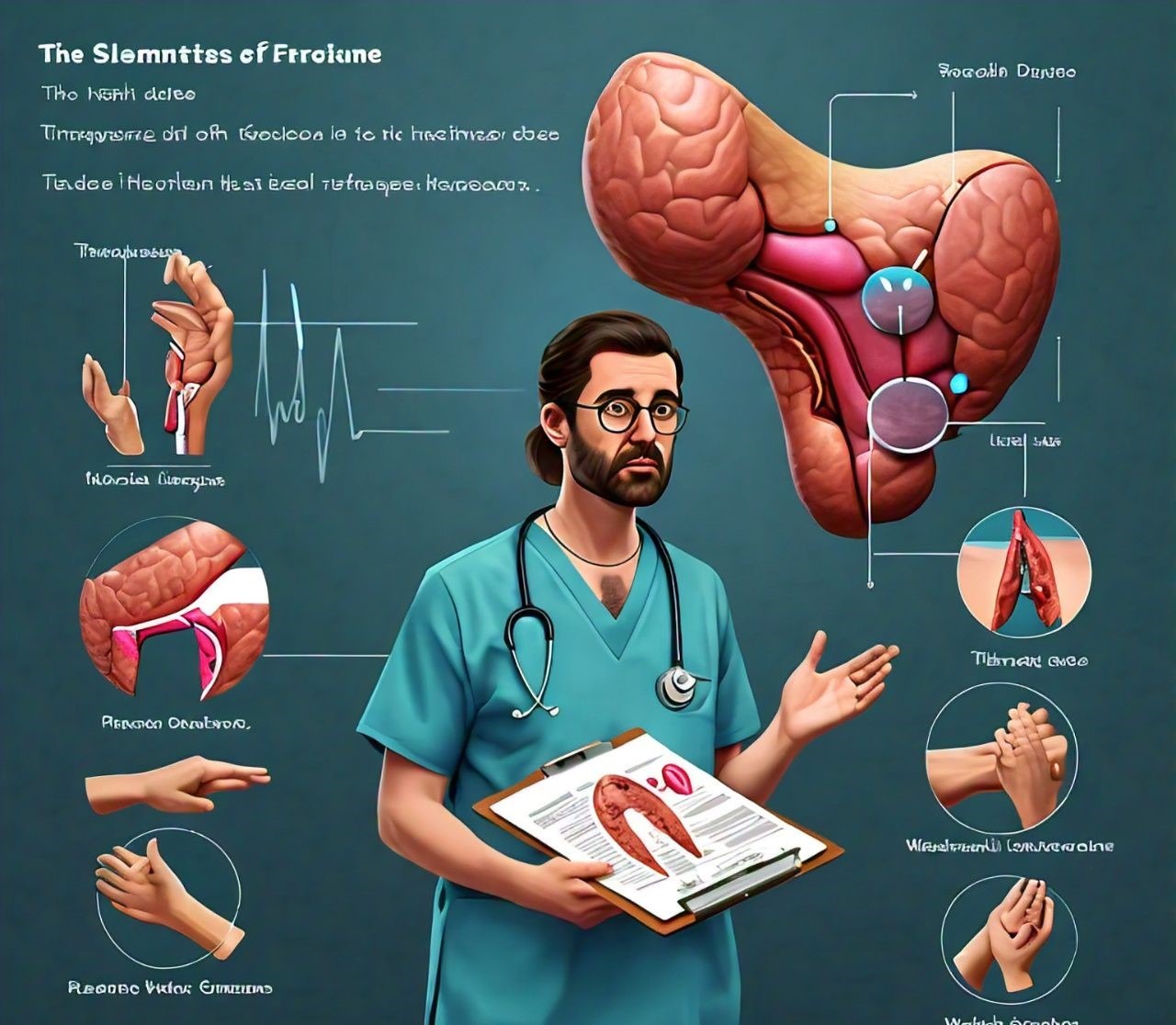Introduction
Graves’ disease is an autoimmune disorder that affects the thyroid gland, leading to an overproduction of thyroid hormones. This condition, also known as hyperthyroidism, can cause a range of symptoms that impact daily life, such as weight loss, rapid heartbeat, anxiety, and fatigue. Managing these symptoms can be challenging, but with the right strategies, it is possible to lead a fulfilling and balanced life. This comprehensive guide offers insights into living with Graves’ disease, how it compares to hyperthyroidism, and explores natural remedies that may help alleviate symptoms.
Understanding Graves’ Disease
Graves’ disease is the most common cause of hyperthyroidism, particularly in women between the ages of 20 and 40. It occurs when the immune system mistakenly attacks the thyroid gland, causing it to become overactive. The excess production of thyroid hormones can affect many bodily functions, including metabolism, heart rate, and body temperature.
Key Symptoms of Graves’ Disease
- Weight loss despite increased appetite
- Rapid or irregular heartbeat (palpitations)
- Tremors or shaking of the hands or fingers
- Sweating or sensitivity to heat
- Anxiety, irritability, or mood swings
- Fatigue and muscle weakness
- Exophthalmos (bulging of the eyes)
- Goiter (enlargement of the thyroid gland)
Fact: Graves’ disease affects about 1 in 200 people in the United States, and women are 7 to 8 times more likely to develop it than men.
Case Study: A study published in The Journal of Clinical Endocrinology & Metabolism showed that 90% of patients with Graves’ disease experience remission within one year of appropriate treatment, such as antithyroid medication, radioactive iodine, or surgery.
Graves’ Disease vs. Hyperthyroidism: What’s the Difference?
Although often used interchangeably, Graves’ disease and hyperthyroidism are not the same. Hyperthyroidism is a condition in which the thyroid gland produces too much thyroid hormone, whereas Graves’ disease is a specific autoimmune disorder that causes hyperthyroidism.
Key Differences:
| Graves’ Disease | Hyperthyroidism |
|---|---|
| Autoimmune disorder | Can be caused by several factors |
| Leads to overproduction of thyroid hormones | Refers to the overactivity of the thyroid gland |
| Commonly associated with exophthalmos (eye bulging) | Does not necessarily involve eye problems |
| Requires long-term management | Treatment depends on the underlying cause |
Causes of Hyperthyroidism (Besides Graves’ Disease)
- Thyroiditis: Inflammation of the thyroid gland can cause temporary hyperthyroidism.
- Nodules: Overactive nodules in the thyroid can increase hormone production.
- Excessive Iodine: Overconsumption of iodine, often through diet or medication, can lead to hyperthyroidism.
Quote: “Graves’ disease is the most common cause of hyperthyroidism, but not the only one. It is crucial to distinguish between the two to ensure proper treatment,” says Dr. Jane Smith, a leading endocrinologist.
Daily Life with Graves’ Disease: Tips and Strategies
Living with Graves’ disease requires managing symptoms and making lifestyle changes that support your overall health. The following tips can help individuals with Graves’ disease maintain a balanced daily routine:
Managing Symptoms
- Medication Adherence: Taking prescribed antithyroid medication is essential for controlling hormone levels. These medications help reduce thyroid hormone production and alleviate symptoms.
- Example: Methimazole and propylthiouracil (PTU) are commonly prescribed medications.
- Regular Doctor Visits: Ongoing monitoring with your healthcare provider is crucial to adjust treatments as needed. Regular blood tests help track thyroid hormone levels.
- Eye Care: If you experience eye problems such as bulging or dryness, use lubricating eye drops and wear sunglasses to protect your eyes from the sun.
- Stress Management: High stress levels can worsen symptoms like anxiety and irritability. Techniques such as deep breathing exercises, yoga, and meditation can help manage stress.
Diet and Nutrition
Eating a balanced, nutrient-rich diet is important for managing Graves’ disease. Certain foods can support thyroid health, while others should be limited or avoided.
Foods to Include:
- Lean Proteins: Fish, chicken, and plant-based proteins like beans can help maintain muscle mass.
- Omega-3 Fatty Acids: Found in salmon, flaxseeds, and walnuts, omega-3s help reduce inflammation.
- Antioxidant-rich Vegetables: Include a variety of colorful vegetables like spinach, broccoli, and carrots to support immune function.
Foods to Avoid:
- Excess Iodine: Too much iodine can exacerbate hyperthyroidism. Limit foods like seaweed, iodized salt, and dairy products.
- Caffeine and Stimulants: These can increase heart rate and anxiety, making symptoms worse.
Tip: Consider working with a nutritionist who specializes in thyroid conditions to develop a personalized meal plan.
Physical Activity
Exercise is beneficial for individuals with Graves’ disease but should be approached with caution due to fatigue and muscle weakness.
- Low-Impact Exercises: Activities like walking, swimming, and yoga help maintain cardiovascular health without putting too much strain on your body.
- Strength Training: Light weight lifting can help rebuild muscle mass lost due to hyperthyroidism.
Mental Health and Well-being
Graves’ disease can affect your mental health, contributing to anxiety, depression, and mood swings. It’s important to focus on emotional well-being and seek support when needed.
- Therapy: Cognitive behavioral therapy (CBT) can help manage anxiety and stress related to the disease.
- Support Groups: Joining a Graves’ disease support group can provide emotional support and connect you with others who understand what you’re going through.
Stat: A study by Thyroid Research and Practice found that individuals with Graves’ disease who participated in support groups reported improved quality of life.
Natural Remedies for Graves’ Disease: Do They Work?
While conventional treatments for Graves’ disease, such as medication and surgery, are often necessary, some people explore natural remedies to complement their care. It’s essential to consult with a healthcare provider before trying any alternative treatments.
Common Natural Remedies
- Selenium Supplements: Selenium is a mineral that may help reduce thyroid inflammation and improve symptoms of hyperthyroidism. Some studies suggest that taking selenium supplements may benefit individuals with Graves’ disease.
- Herbal Remedies:
- Bugleweed is believed to reduce thyroid hormone levels.
- Lemon balm may help calm the nervous system and reduce anxiety.
- Acupuncture: This traditional Chinese medicine technique is used by some to manage stress and improve well-being, but its effectiveness for Graves’ disease is not well-established.
- Vitamin D: Individuals with autoimmune disorders often have low levels of vitamin D. Supplementing with vitamin D may support immune health.
Do Natural Remedies Work?
The effectiveness of natural remedies for Graves’ disease is still under research. While some remedies, like selenium, show potential, they should not replace conventional treatments. Combining natural remedies with prescribed treatments under medical supervision can help manage symptoms but will not cure Graves’ disease.
Conclusion
Living with Graves’ disease presents unique challenges, but with proper management, individuals can maintain a healthy and fulfilling life. Understanding the distinction between Graves’ disease and hyperthyroidism is essential for targeted treatment, and lifestyle adjustments such as stress management, a thyroid-friendly diet, and regular exercise can help manage symptoms.
Although natural remedies may offer additional relief, they should be used cautiously and in conjunction with medical advice. By staying informed and proactive in your approach to managing Graves’ disease, you can take control of your health and improve your quality of life.
For more information on fitness and health, check out these resources:
Explore more articles on our site:
- How to Increase Running Stamina for Beginners at Home
- What Happens if You Don’t Get Enough Sleep Consistently: Effects and Solutions
- The Ultimate Guide to Healthy Living in 2024
- The Future of Artificial Intelligence: What to Expect
- Unlocking the Potential of Chat GPT Software: Revolutionizing AI Conversations
- Best Sleeping Position for Peripheral Artery Disease [New 2024]
- How to Increase Running Stamina for Beginners at Home
- 5 New Inner Thigh Exercises for Men and Women




